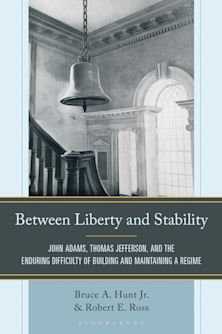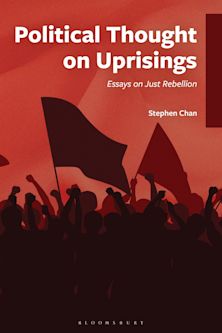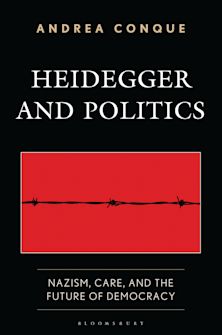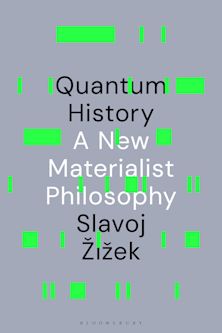- Home
- ACADEMIC
- Politics & International Relations
- Political Theory and Philosophy
- Eric Voegelin Today
Eric Voegelin Today
Voegelin’s Political Thought in the 21st Century
Scott Robinson (Anthology Editor) , Lee Trepanier (Anthology Editor) , David Whitney (Anthology Editor) , David D. Corey (Contributor) , Nathan W. Harter (Contributor) , Grant Havers (Contributor) , Christopher S. Morrissey (Contributor) , Scott Robinson (Contributor) , Scott Philip Segrest (Contributor) , Lee Trepanier (Contributor) , David Whitney (Contributor)
Eric Voegelin Today
Voegelin’s Political Thought in the 21st Century
Scott Robinson (Anthology Editor) , Lee Trepanier (Anthology Editor) , David Whitney (Anthology Editor) , David D. Corey (Contributor) , Nathan W. Harter (Contributor) , Grant Havers (Contributor) , Christopher S. Morrissey (Contributor) , Scott Robinson (Contributor) , Scott Philip Segrest (Contributor) , Lee Trepanier (Contributor) , David Whitney (Contributor)
This product is usually dispatched within 1 week
- Delivery and returns info
-
Free US delivery on orders $35 or over
You must sign in to add this item to your wishlist. Please sign in or create an account
Description
This book analyzes Eric Voegelin’s scholarly works from the 1950s and early 1960s and examines the ways in which these works are relevant to the twenty-first century political environment. The collection of essays evaluated in this book cover a wide array of topics that were of great curiosity sixty years ago and still relevant in today’s society. The authors in this volume demonstrate that Voegelin’s erudition on topics such as revolutionary change, ideological fervor, industrialization, globalism, and the place for reason and how it may be cultivated in complex times remains as meaningful today as it was then.
Table of Contents
David D. Corey
Chapter 2: The Necessity of Moral Communication in a Pluralistic Political Environment
Scott Robinson
Chapter 3: Defenders of Democracy: Freedom and Responsibility in America Today
Scott Robinson
Chapter 4: The Origins of Scientism: Revisited
David N. Whitney
Chapter 5: Voegelin, Rawls, and the Persistence of Liberal Civil Theology
Grant Havers
Chapter 6: The Comparative Politics of Eric Voegelin
Lee Trepanier
Chapter 7: The Dream of the Caliphate and the Loss of Reality: An Application of Eric Voegelin’s “The Origins of Totalitarianism” and “In Search of the Ground”
Scott Philip Segrest
Chapter 8: “The Five Ways of World-Empire”
Christopher S. Morrissey
Chapter 9: Eric Voegelin’s 1944 “Political Theory and the Pattern of General History”: An Account from the Biography of a Philosophizing Consciousness
Nathan Harter
Product details
| Published | Jul 25 2019 |
|---|---|
| Format | Hardback |
| Edition | 1st |
| Extent | 222 |
| ISBN | 9781498596633 |
| Imprint | Lexington Books |
| Dimensions | 9 x 6 inches |
| Series | Political Theory for Today |
| Publisher | Bloomsbury Publishing |
About the contributors
Reviews
-
In what is a book of very different essays that address the political corruptions of our era (for example, liberalism) – unexpected topics that heighten a reader’s anticipation of what “what will be the subject of the next essay?” – the authors not only have clarified and adopted Voegelin’s creative symbolism, they have demonstrated their use. The authors exemplify for the reader an instructive employment of creatively new tools of analysis provided in Voegelin’s symbolisms that can work to interpretatively critique political communities in the 21st Century.
VoegelinView
-
Commentary on the work of Eric Voegelin has grown enormously since his death in 1985. This excellent collection of essays and analyses of Voegelin’s work published during the late 1950s and early 1960s adds greatly to our understanding of the development of his thought during this period and of its applicability to currently political realities. That it was written chiefly by younger scholars is further evidence of the enduring appeal of Voegelin’s political science.
Barry Cooper, University of Calgary
-
Between 1940 and 1960 while he was working out his general theory of politics and history, Eric Voegelin also wrote a series of essays with a more pragmatic focus on democratization, empire, the “good society,” industrialization, science, and the possibility of moral communication in mass society. During this time he also moved to Munich in an effort to render socially effective the life of noetic reason in post-war Germany. Thus these essays are also examples of scholarly statecraft. The contributors to this volume follow his cues by considering those mid-career essays and reflecting pragmatically on contemporary political problems, including the current state of liberalism and progressivism, transhumanism, radical Islamism, and the state of the American polity. They admirably follow in Voegelin’s footsteps in bringing about “clarity of awareness” for scholar and citizen alike.
John von Heyking, University of Lethbridge
-
The essays in this volume furnish a superb account of Voegelin’s mature interventions as a public intellectual. His return to Germany resulted in more invitations to speak on matters of broad public interest and his concern with the ideological cleavages of the day provoked him to offer the fruits of his historical meditation in a more contemporary setting. The contributors to this collection have rightly grasped the continuing relevance of Voegelin’s thought in the increasingly ideological climate of our own time. Eric Voegelin for Today is both a work of philosophic retrieval and a work of civic remediation that is sorely needed.
David Walsh, Catholic University of America
-
Eric Voegelin is widely regarded as one of the preeminent political thinkers of the twentieth century. Present-minded academics may be tempted to thrust aside his insights as responses to bygone circumstances; but as this volume demonstrates, Voegelin’s piercing reflections on liberalism, modernity, ideology and mass politics remain relevant in the twenty-first century. By focusing on Voegelin’s postwar writings, rendering his insights up-to-date, and applying his perspective to the contemporary scene, the essays in Eric Voegelin Today offer vital contributions to discourse on contemporary politics and political thought, Voegelinian and otherwise.
Alan Baily, Stephen F. Austin State University



































